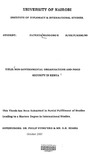| dc.contributor.author | Wangong'u, Patricia | |
| dc.date.accessioned | 2016-06-16T06:59:24Z | |
| dc.date.available | 2016-06-16T06:59:24Z | |
| dc.date.issued | 2001 | |
| dc.identifier.uri | http://hdl.handle.net/11295/96124 | |
| dc.description.abstract | This Study focused on the social dimension of food production, distribution and policies that affect food security. It set out to examine the roles of NGOs in food security with specific reference to the national food policies. The ultimate goal of the study was to provide recommendations towards the policy formulation process. To this end it was found that all stakeholders must be involved throughout the formulation, implementation and evaluation stages. The view of the NGOs during the process were found to be important as they are in touch with people on the ground and are able to articulate their problems. The level of government commitment to implement food policies was observed to affect full participation of NGOs. The land tenure policy was particularly found to bring about conflict in terms of participation of women in agricultural production.
The study’s findings show that despite fairly sound national food policies on paper, in practice their implementation is an impediment to NGOs food security activities. The study has made some observations in the area of food policy, especially with regard to the role of NGOs. Some recommendations have been suggested as a result of the study. | en_US |
| dc.language.iso | en | en_US |
| dc.publisher | University of Nairobi | en_US |
| dc.rights | Attribution-NonCommercial-NoDerivs 3.0 United States | * |
| dc.rights.uri | http://creativecommons.org/licenses/by-nc-nd/3.0/us/ | * |
| dc.title | Non-governmental Organizations and Food Security in Kenya | en_US |
| dc.type | Thesis | en_US |



